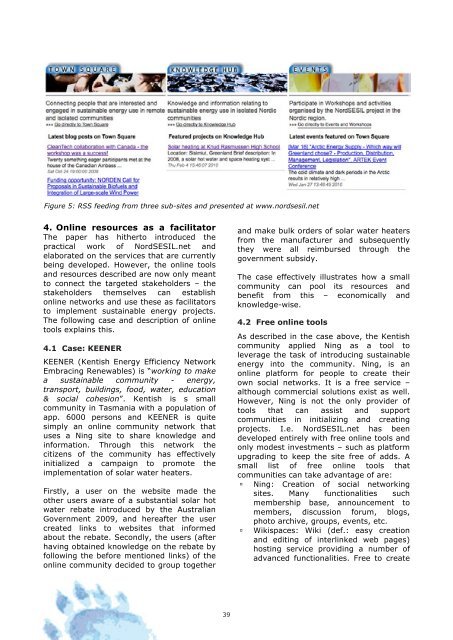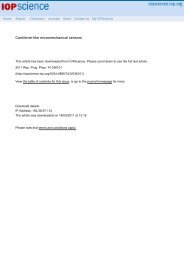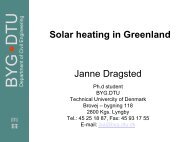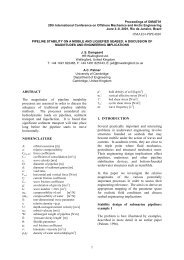Energiforsyning i Arktis – hvilken vej vælger Grønland? - Artek ...
Energiforsyning i Arktis – hvilken vej vælger Grønland? - Artek ...
Energiforsyning i Arktis – hvilken vej vælger Grønland? - Artek ...
You also want an ePaper? Increase the reach of your titles
YUMPU automatically turns print PDFs into web optimized ePapers that Google loves.
Figure 5: RSS feeding from three sub-sites and presented at www.nordsesil.net<br />
4. Online resources as a facilitator<br />
The paper has hitherto introduced the<br />
practical work of NordSESIL.net and<br />
elaborated on the services that are currently<br />
being developed. However, the online tools<br />
and resources described are now only meant<br />
to connect the targeted stakeholders <strong>–</strong> the<br />
stakeholders themselves can establish<br />
online networks and use these as facilitators<br />
to implement sustainable energy projects.<br />
The following case and description of online<br />
tools explains this.<br />
4.1 Case: KEENER<br />
KEENER (Kentish Energy Efficiency Network<br />
Embracing Renewables) is “working to make<br />
a sustainable community - energy,<br />
transport, buildings, food, water, education<br />
& social cohesion”. Kentish is s small<br />
community in Tasmania with a population of<br />
app. 6000 persons and KEENER is quite<br />
simply an online community network that<br />
uses a Ning site to share knowledge and<br />
information. Through this network the<br />
citizens of the community has effectively<br />
initialized a campaign to promote the<br />
implementation of solar water heaters.<br />
Firstly, a user on the website made the<br />
other users aware of a substantial solar hot<br />
water rebate introduced by the Australian<br />
Government 2009, and hereafter the user<br />
created links to websites that informed<br />
about the rebate. Secondly, the users (after<br />
having obtained knowledge on the rebate by<br />
following the before mentioned links) of the<br />
online community decided to group together<br />
39<br />
and make bulk orders of solar water heaters<br />
from the manufacturer and subsequently<br />
they were all reimbursed through the<br />
government subsidy.<br />
The case effectively illustrates how a small<br />
community can pool its resources and<br />
benefit from this <strong>–</strong> economically and<br />
knowledge-wise.<br />
4.2 Free online tools tools<br />
As described in the case above, the Kentish<br />
community applied Ning as a tool to<br />
leverage the task of introducing sustainable<br />
energy into the community. Ning, is an<br />
online platform for people to create their<br />
own social networks. It is a free service <strong>–</strong><br />
although commercial solutions exist as well.<br />
However, Ning is not the only provider of<br />
tools that can assist and support<br />
communities in initializing and creating<br />
projects. I.e. NordSESIL.net has been<br />
developed entirely with free online tools and<br />
only modest investments <strong>–</strong> such as platform<br />
upgrading to keep the site free of adds. A<br />
small list of free online tools that<br />
communities can take advantage of are:<br />
� Ning: Creation of social networking<br />
sites. Many functionalities such<br />
membership base, announcement to<br />
members, discussion forum, blogs,<br />
photo archive, groups, events, etc.<br />
� Wikispaces: Wiki (def.: easy creation<br />
and editing of interlinked web pages)<br />
hosting service providing a number of<br />
advanced functionalities. Free to create





